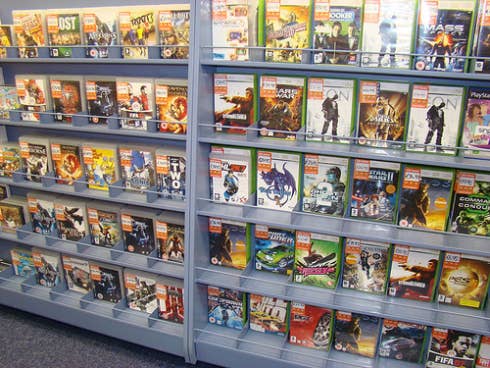Pre-owned increases cost of games, cannibalizes industry, says Dyack
"There's not going to be an industry," warns Silicon Knights head
Used games are a constant irritant for many in this industry - they're at best tolerated and at worst despised with a passion. Frontier Development's David Braben recently lashed out against the used games business, saying that it's effectively killed off single-player titles, and now Silicon Knights boss Denis Dyack has weighed in with his thoughts as well.
Speaking to GamesIndustry International, Dyack remarked, "From a consumer side, [in the last few years] we started seeing used games really come into fruition, and I believe that has caused quite a problem. I would argue that used games actually increase the cost of games."
The biggest problem is that used games have essentially cut off the revenue tail for most titles, Dyack explained.
"If used games continue the way that they are, it's going to cannibalize, there's not going to be an industry"
Denis Dyack
"There used to be something in games for 20 years called a tail, where say you have a game called Warcraft that would sell for 10 years. Because there are no used games, you could actually sell a game for a long time, and get recurring revenue for quite a while. Recurring revenue is very key," he said.
"Now there is no tail. Literally, you will get most of your sales within three months of launch, which has created this really unhealthy extreme where you have to sell it really fast and then you have to do anything else to get money," he continued, alluding to steps developers take like including multiplayer or launching DLC.
Dyack warned that if the pre-owned market continues unchecked it could threaten the industry as we know it.
"I would argue, and I've said this before, that used games are cannibalizing the industry. If developers and publishers don't see revenue from that, it's not a matter of hey 'we're trying to increase the price of games to consumers, and we want more,' we're just trying to survive as an industry. If used games continue the way that they are, it's going to cannibalize, there's not going to be an industry," he said. "People won't make those kinds of games. So I think that's inflated the price of games, and I think that prices would have come down if there was a longer tail, but there isn't."

For its part, leading games retailer GameStop has unsurprisingly come to the defense of its used games empire. The company's argument is that the money from used games and trade-ins ultimately fuels the industry as a whole.
"Remember that used video games have a residual value. Remember that GameStop generates $1.2 billion of trade credits around the world with our used games model. So, consider taking used games out of that, you'd have to find new ways to sell the games, and our partners at the console companies have great relationships with us," CEO Paul Raines said during the company's last earnings call.
"What we've done is created a way for that new leading edge consumer to dispose of their old games and that's what creates this great circle of life we talk about that so many try to imitate."
"People once again are saying we're going to have development costs that are two or three times of what they were last generation. I cannot see how that economy is going to continue"
Denis Dyack
Beyond the pre-owned problem, the games industry also faces a problem of costs for triple-A projects spiraling out of control.
"On the top side of the triple-A, highly-funded titles, you have $100 million games, and looking towards next generation people once again are saying we're going to have development costs that are two or three times of what they were last generation. I cannot see how that economy is going to continue," Dyack stated.
"I don't think as an industry we can afford $300 million budgets. I think some games can, don't get me wrong. For a game like Call of Duty, if they had a $100 million budget, or whatever their budget is, they can afford it. That's not the industry, that's sort of a one-off. But what is everyone else going do?"
Indeed, a mid-size developer could invest $40-$60 million in a triple-A project and if that title tanks at retail, it could truly wreak havoc on the company.
"It comes back to that tail I talked about, recurring revenue. We need a system with recurring revenue and that's why I think digital distribution is going to play a big role in things to come. That's why I am still very big on cloud computing," Dyack concluded.

